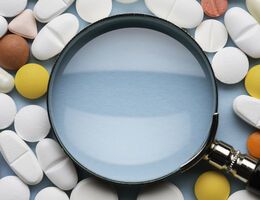Health library
Back to health libraryCompounding pharmacies: What to know

Aug. 18, 2025—Sometimes regular medicines don't fit a patient's unique needs (or aren't available). That's where compounding pharmacies come in.
A compounding pharmacy makes medicines by mixing or changing ingredients to meet an individual's needs. These are called compounded medicines.
In recent years, compounded medicines for weight loss, menopause, hair loss and erectile dysfunction have become popular. If you've seen ads for commercial compounding pharmacies on TV or online, you might wonder if they're safe.
Here are answers to some common questions people have about compounding pharmacies.
Why do people need compounded medicine?
People may need these types of medications for many reasons. They may need:
- A dose that's not available in the regular version.
- A different form of the drug—for example, changing a pill into a liquid for someone who can't swallow tablets.
- A medicine that doesn't have certain ingredients because of an allergy.
Also, if a needed medicine has been changed, a compounded version can be made to match the original.
Are compounded medicines FDA-approved?
Because these medicines are made for one specific person, they are not approved by the U.S. Food and Drug Administration (FDA). This doesn't mean they're not safe. Trusted compounding pharmacies use trained pharmacists to make them.
But using these medicines—especially when they're obtained through online pharmacies—does come with risks, including:
Contamination. If a pharmacy doesn't meet rigorous cleanliness standards, a medicine could be contaminated with mold, germs or other medications.
Incorrect dosages. For example, some illegally marketed medications have too much or too little of the active ingredient, warns FDA. Some don't contain the active ingredient at all.
Fake products. It's against the law, but some online pharmacies sell counterfeit medications. Those might contain the wrong ingredients, the wrong dose of the active ingredients or ingredients not intended for human use.
Unsafe prescriptions. Many compounding pharmacies work with your doctor or hospital to help you get the medicine you need. But some don't require a prescription or have a pharmacist who can answer questions. That could put you at risk for serious complications, depending on your health conditions and any medications you take.
How can I use online pharmacies safely?
Getting compounded medicines through online pharmacies or telehealth clinics can be easy. And it's sometimes a cheaper option. But you should take steps to stay safe. Start with this advice from FDA and the National Council on Aging:
- Check with your doctor first to confirm the medicine is right for you.
- Make sure the medicine requires a prescription.
- Check that the pharmacy has a physical address and phone number in the United States.
- Make sure there's a licensed pharmacist available to answer questions.
- Confirm the medicine is sealed, undamaged and not expired when you get it.
To learn more about managing medications safely, visit our Medications topic center.
Sources
- National Council on Aging. "What Are Compounded Medications?" https://www.ncoa.org/article/what-are-compounded-medications/.
- U.S. Food and Drug Administration. "Compounding and the FDA: Questions and Answers." https://www.fda.gov/drugs/human-drug-compounding/compounding-and-fda-questions-and-answers.
- U.S. Food and Drug Administration. "Considering an Online Pharmacy?" https://www.fda.gov/drugs/besaferx-your-source-online-pharmacy-information/considering-online-pharmacy.
- U.S. Food and Drug Administration. "FDA Alerts Health Care Providers, Compounders and Consumers of Potential Risks Associated With Compounded Topical Finasteride Products." https://www.fda.gov/drugs/human-drug-compounding/fda-alerts-health-care-providers-compounders-and-consumers-potential-risks-associated-compounded.
- U.S. Food and Drug Administration. "FDA's Concerns With Unapproved GLP-1 Drugs Used for Weight Loss." https://www.fda.gov/drugs/postmarket-drug-safety-information-patients-and-providers/fdas-concerns-unapproved-glp-1-drugs-used-weight-loss.
